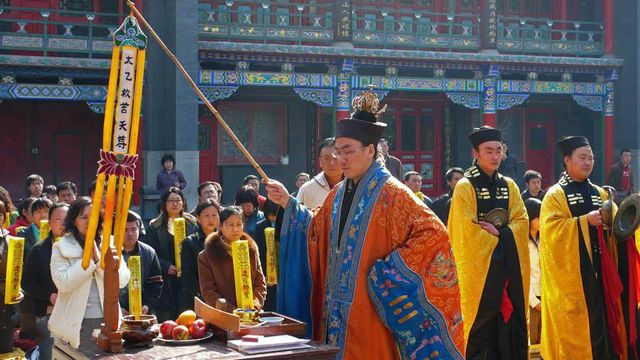Transcendence (Chāodù): Redemption for the Deceased Souls
Share
I. The Meaning of Transcendence
Literally, "transcendence" (chāodù) carries meanings such as "to skip over," "to surpass," "to excel," and "to rescue." Currently, it is most commonly used to refer to "freeing the souls of the deceased from various sufferings." From a Taoist perspective, transcendence involves a high-ranking Taoist priest (Gāogōng) connecting with Taoist ancestors or immortals through internal spiritual cultivation. The priest rescues souls that are still trapped in the netherworld or lingering in the human realm, and with the guidance of immortals, hopes these souls will ascend to the Eastern Pure Flower Blissful Realm at an early date. The primary deity worshipped in Taoist transcendence rituals is the Supreme Ultimate Savior (Tàiyǐ Jiùkǔ Tiānzūn).

II. Types of Transcendence and Their Merits
Transcendence rituals can be divided into four categories: transcending wandering souls from all directions, transcending ancestral lineage, worshipping ancestors, transcending karmic creditors, and transcending aborted baby souls.
-
Transcending Wandering Souls from All Directions
This ritual involves setting up an altar and holding a Taoist ceremony to gather all types of wandering ghosts from all directions at the altar, guiding and transcending them to free them from suffering and help them be reborn in the blissful realm. Such transcendence is most suitable for major benefactors to perform meritorious deeds and give alms according to their ability, in order to cultivate blessings. The number of wandering souls transcended is countless, and all will be grateful for the benefactor’s compassion and generosity. Their vast and powerful thoughts of gratitude will persist even through successive reincarnations. This gratitude helps the benefactor form extensive good karma, quickly accumulate blessings, and even benefit future generations—heavenly deities in charge of rewards and punishments will record these merits in the "merit book." -
Transcending Ancestral Lineage and Worshipping Ancestors
Many people do not attach importance to transcending ancestors, regarding it merely as an expression of filial piety. Little do they know that the thousand-year-old tradition of ancestral worship has profound secrets: whether ancestors are transcended and at peace directly determines the development trajectory of the family’s descendants and the karmic consequences they inherit. A person has three souls: the Tāiguāng soul (governing life) returns to the Great Harmony after death; the Shuǎnglíng soul (governing nobility) returns to the netherworld under the Five Great Mountains; the Yōujīng soul (governing decline) returns to the Water Palace. Moreover, only one of the three souls and seven spirits is reincarnated after death. Therefore, worshipping ancestors holds great practical significance for both the deceased relatives and the living family members. In other words, ancestral souls, whether they have entered the cycle of reincarnation or not, can receive the messages of our worship and offerings. Hence, ancient people would worship ancestors first before important events, and the Qingming Festival (Tomb-Sweeping Day) is the best time to transcend ancestors. -
Transcending Karmic Creditors
This refers to transcending karmic creditors from past and present lives. Karmic consequences constantly change and accumulate based on one’s actions. As the saying goes, "A single thought can trigger calamity"—all karmic disasters, illnesses, troubles from villains or evil forces, unexpected misfortunes, and fluctuating fortunes arise from karmic creditors of past and present lives. Therefore, transcending karmic creditors is an excellent way to form good karma, sever bad karma, and rid oneself of evil attachments. -
Transcending Aborted Baby Souls
"Baby souls" (yīnglíng) refer to the souls of babies who die from abortion, stillbirth, or early infancy. Since their parents do not help them undergo transcendence, their souls have no refuge and cannot be reborn, lingering in the human realm and harboring endless resentment. They then find their relatives through the magnetic bond of blood, haunting and causing harm—leading to injuries, accidents, or even death of parents and siblings, as well as family unrest and social fear. For fathers, the most direct impact is unstable fortune and career luck, and a sluggish career; for mothers, it is poor health, chronic gynecological diseases, nightmares, and insomnia.
III. Steps of Transcendence Rituals
-
Fasting and Purification
Before performing the ritual, the priest must fast, bathe, and purify both mind and body to ensure their prayers can reach heaven. -
Altar Setup
Before setting up the altar, prepare soul-calling banners and other flags. Set up both a Yin (netherworld) altar and a Yang (human world) altar. On the Yin altar, place the memorial tablets of the deceased, fresh flowers, offerings of fruit, three servings of tea, four servings of wine, three meat dishes, four vegetarian dishes, incense, candles, rice, steamed buns, and paper money. -
Ascending the Altar to Perform the Ritual
After ascending the altar, the priest first performs a ritual to purify the altar, then begins the transcendence ceremony. -
Reciting Sutras
During the ritual, the priest recites many scriptures. Common Taoist scriptures include The Supreme Mystery Scripture of Saving from Suffering and Delivering from Sins and The Scripture of the Primordial Heavenly Lord on Eliminating Sins in the Underworld. For female deceased, The Scripture of the Supreme Ultimate Savior on Delivering from the Blood Lake in the Underworld is additionally recited. -
Offering Food and Burning Offerings
After the priest completes the ritual, tea, wine, and rice are scattered around for the souls to consume. Meanwhile, paper money is burned, and some people also burn various paper effigies (e.g., paper houses, paper clothes).
Transcending the souls of the deceased to help them be reborn is a deed of immense merit for both the priest and the sponsor. Understanding transcendence correctly allows us to choose the right way to do good deeds.